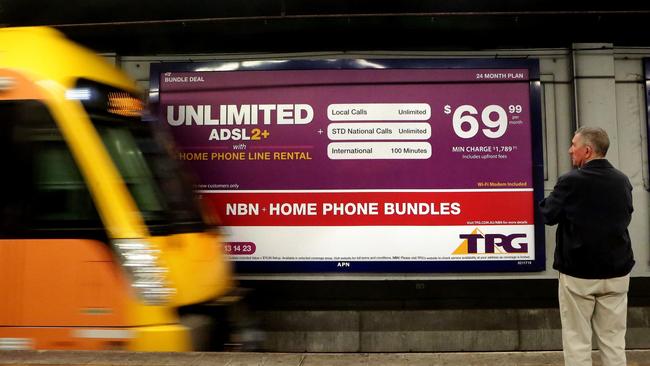TPG, Vodafone to take ACCC to court after $15bn merger blocked
The scene is set for a legal showdown after the ACCC blocked TPG’s $15bn Vodafone merger.

Vodafone Australia and TPG Telecom are taking the competition regulator to court, with Vodafone boss Inaki Berroeta saying that the Australian Competition and Consumer Commission was forcibly trying to reshape the mobile market by rejecting the $15 billion merger between the two telcos.
Shares in TPG Telecom had earlier plunged almost 15 per cent after news of the ACCC’s decision to block the deal was inadvertently published ahead of schedule.
“The ACCC is trying to create an ideal market structure which doesn’t gel with reality,” Mr Berroeta said in a press conference after the regulator revealed its decision.
“It’s a fallacy and we will contest this decision.”
Meanwhile, TPG said that the ACCC’s decision has severe implications for the market.
“While we respect the ACCC’s process, its decision has significant implications for Australian consumers, and in our view, must be challenged,” it said in a statement.
“TPG considers that there is a compelling case to seek orders from the Federal Court of Australia that the proposed merger will not, and is not likely to substantially lessen competition.”
With the telcos and the ACCC now set to square off in court, TPG and Vodafone have extended the date for the implementation of the mooted merger to August 31 2020.
The Australian Competition and Consumer Commission was originally expected to formally announce its position on Thursday and one industry source told The Australian that the earlier-than-expected release was an unprecedented mistake by the regulator and had caught the telcos by surprise.
A fuller statement was released after the market close, which said, as tipped by The Australian’s John Durie, that the merger was being opposed because it would have further concentrated market power in the mobile industry.
ACCC boss Rod Sims told The Australian that allowing the merger to go ahead would have locked in a market structure where three mobile operators called the shots.
“We always knew that a court challenge was a possibility and we are ready for it … ultimately we had to make a judgment that’s in the best interest of consumers and locking in the existing structure doesn’t help them,” he said.
Telstra, Optus and Vodafone, have over 87 per cent share of the mobile market and Mr Sims said that the merger would put to bed any chance of a fourth mobile operator entering the market.
“We don’t know how the market will develop but whatever changes do happen we want them to be a part of a competitive process between operators.”
“TPG is the best prospect Australia has for a new mobile network operator to enter the market, and this is likely the last chance we have for stronger competition in the supply of mobile services,” he said.
While TPG in January stopped rolling out its $600 million mobile network, citing the ban of Hauwei’s 5G equipment, Mr Sims said there was no reason why the telco couldn’t restart the process.
“We still believe they can build a network and will build it given the investments they have made so far and the imperative is there for them to do so,” he told The Australian.
“TPG already has mobile spectrum, an extensive fibre transmission network which is essential for a mobile network, a large customer base and well-established telecommunications brands.”
New Street Research telecommunications analyst, Ian Martin, said that the ACCC’s logic doesn’t quite add up and the regulator may be too optimistic in its belief that TPG will build a mobile network.
“TPG is not going to build a mobile network on its own so the regulator’s decision doesn’t make sense,” he told The Australian.
He was also critical of the manner in which the ACCC had released the information.
“It’s more than bizarre and reflects the lack of understanding of the impact of the decision on the market.”
“It really brings into question the competence of the regulator.”
The two telcos will argue there is no reason to block the deal because there is no fourth network in Australia and because TPG and Vodafone are complementary and do not compete.
They will argue the Federal Government’s decision to block Huawei as a 5G equipment supplier meant TPG could not roll out its network.
The ACCC has rejected this argument arguing there are alternate suppliers including Nokia and Ericsson.
It will argue TPG can now make a decision about what to do and, having spent some years looking at building a mobile network, it will face the same commercial imperatives when it comes to making its choice.
TPG (TPM) shares closed down 13.5 per cent at $6.07, below its level on August 22 when the deal was announced.




To join the conversation, please log in. Don't have an account? Register
Join the conversation, you are commenting as Logout